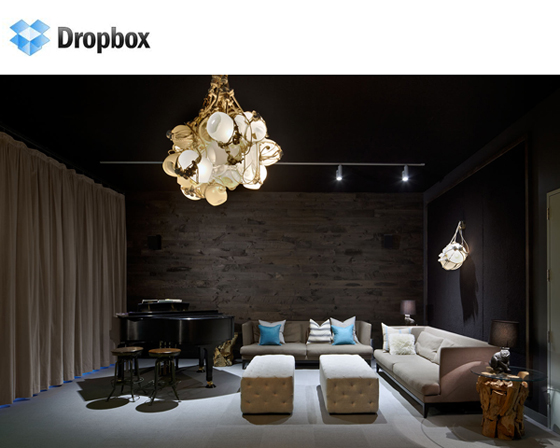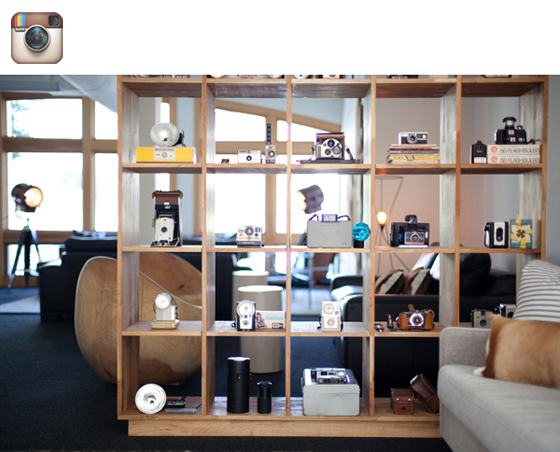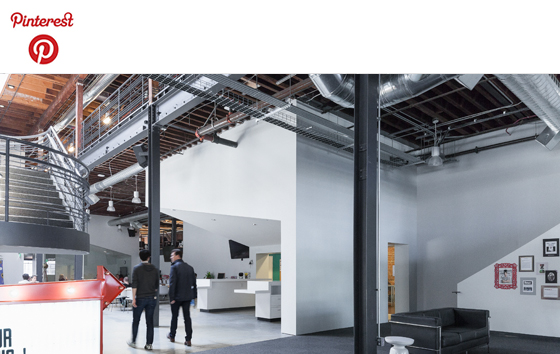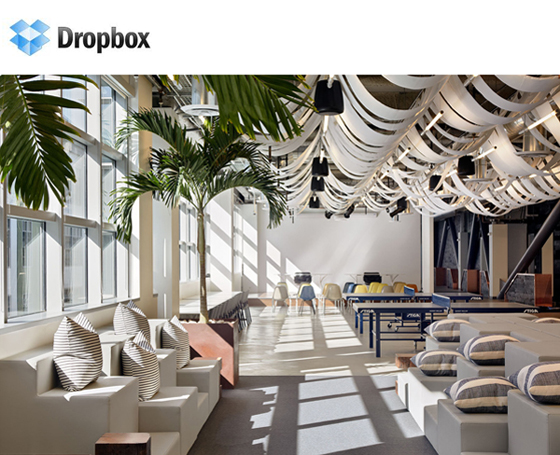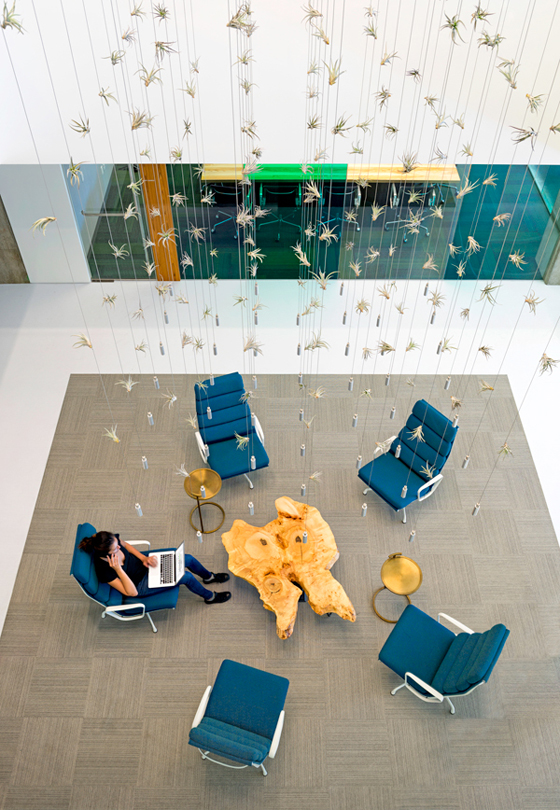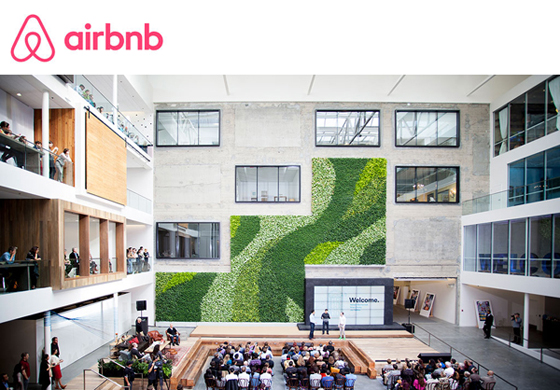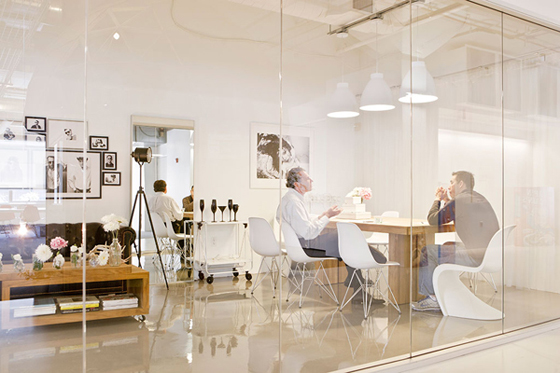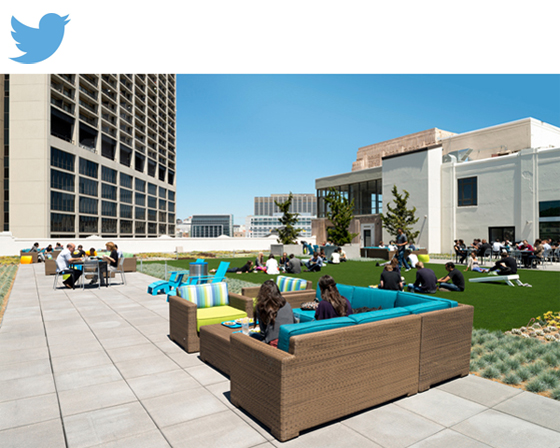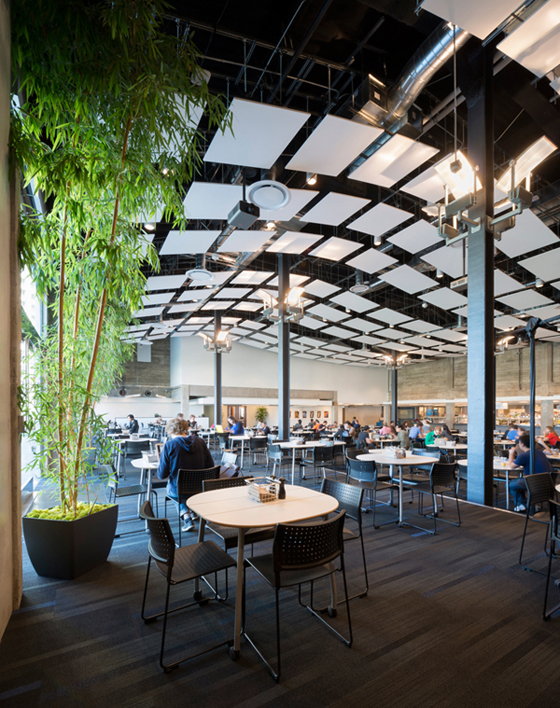Where the Future Happens
Scritto da Orgatec Blog
Germania
27.10.14
In September, we saw the launch of the eagerly anticipated Apple Watch. Much has already been said about the potential impact of this device on the worlds of consumer electronics, fashion, well-being and productivity. It’s certainly a step forward when compared with other computers for your wrist already on the market, whatever your view of the design – or indeed of Apple.
Beneath the headlines, it was some of the more subtle digital service announcements associated with the Apple Watch and iPhone 6 that could in fact have the biggest impact on how we choose to live and work in the near future ... but more of that later. For now, our focus is on the environments in which our digital futures are being formed. California is home to Apple and a number of the most innovative digital service companies. In a bid to secure the best talent and build environments that foster creativity and drive business growth, the workspaces of these innovative internet companies are as interesting as the services they provide.
Clear value cues
The photo-sharing service Instagram, renowned for referencing the 1960s aesthetic of Kodak’s Instamatic square-shaped photos, has a recognisably retro feel throughout its office space. According to interior designers Geremia Design, this was their inspiration for the direction of the office interior: ‘The design for the Instagram office was inspired by their branding. We created a custom coffee station and built an inventory of retro furniture.’ Other bespoke details include a curated vintage camera collection, which is on display in the entrance area. The result is an environment with a set of clear visual cues that connect to Instagram’s brand values.
Geremia Design for Instagram: Instagram, renowned for referencing the 1960s Kodak’s Instamatic square-shaped photos, has a recognisably retro feel throughout their office space. Bespoke details include a curated camera collection and custom furniture

Geremia Design for Instagram: Instagram, renowned for referencing the 1960s Kodak’s Instamatic square-shaped photos, has a recognisably retro feel throughout their office space. Bespoke details include a curated camera collection and custom furniture
×Another successful online image tool is Pinterest, founded by former architect Evan Sharp four years ago. The company has already grown from an initial team of twelve to more than 300 employees. This rapid growth of a company – which in their words ‘is a place to discover ideas for all your projects and interests’ – has a lot to do with Sharp’s ‘stay hungry’ ethos: one he sought to communicate through the new 45,000-square-foot interior in San Francisco’s SoMA neighbourhood. ‘The office feels intentionally unfinished. We didn’t want the space to give the impression of success or complacency or decadence, the way a lot of studio and agency spaces feel to me.’ So no stereotypical slides here.
Pinterest by First office and All of the Above: To fuel a ‘stag hungry’ ethos, Evan Sharp Pinterest’s founder wanted to make the space feel unfinished, as he didn't want the space to give the impression of success, complacency or decadence

Pinterest by First office and All of the Above: To fuel a ‘stag hungry’ ethos, Evan Sharp Pinterest’s founder wanted to make the space feel unfinished, as he didn't want the space to give the impression of success, complacency or decadence
×Flexible and future-focused
The rapid growth rate of internet-based start-ups means their offices need to cater not only to the ever-increasing sizes of their teams, but also to the agile ways in which they work. File-hosting service Dropbox was founded in 2007 and now has more than 175 million customers. It recently had a $4 billion valuation from venture investors, and its co-founders, Drew Houston, 30, and Arash Ferdowsi, 27, are ranked in the Top 10 of Wealth-X’s list of the wealthiest 30-and-under ‘technopreneurs’ in the United States. The design team responsible for Instagram’s interior, Geremia Design, also designed Dropbox’s first office, a space they outgrew within two years. Geremia was called upon again to resolve the new 74,000-square-foot space in San Francisco. According to Geremia, ‘Dropbox’s rapid growth rate as a business was a big challenge for our design. We had to think about what Dropbox as a company would need in the future, and keep a sense of flexibility in the design for the company to grow into.’ Working with Boor Bridges Architecture, the designers created a simple floor plan to allow the employees to ‘hack’ the space to suit their immediate and evolving needs.
Dropbox’s rapid growth rate as a business was a big challenge for Geremia design, the team had to think about what Dropbox as a company would need in the future and keep a sense of flexibility in the design for the company to grow into
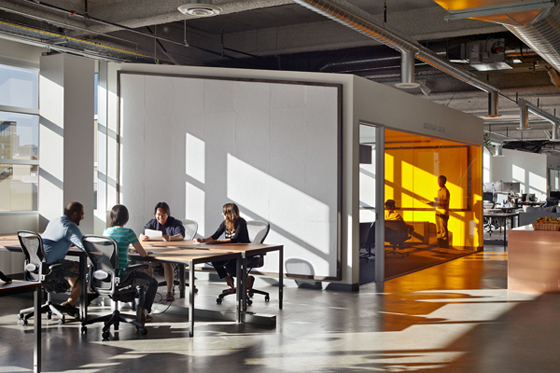
Dropbox’s rapid growth rate as a business was a big challenge for Geremia design, the team had to think about what Dropbox as a company would need in the future and keep a sense of flexibility in the design for the company to grow into
×San Francisco is also home to Cisco, an 110,000-square-foot workplace designed by Studio O+A and located in the rapidly changing Mission Bay neighbourhood. Within the bright and airy space – offering panoramic views of the waterfront – bespoke furnishings play a key role in providing a more flexible way to work: from traditional typologies to sunken seating areas for collaborative activities and more contemporary ‘cocoons’ for more private conversations.
Home, hospitality and heath
The offices of some of the biggest internet companies are far more than places to work in. They are the employees’ home away from home; places in which they can not only work, but also relax, be entertained and recharge the mind and body.
Cisco by O+A: The Cisco offices in San Francisco, by Studio O+A, feature a medley of informal spaces, with lounge furnishings for more casual collaboration
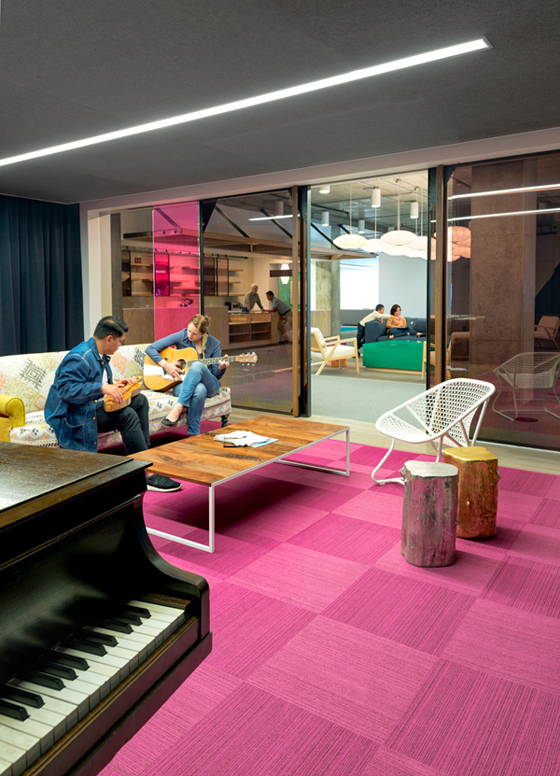
Cisco by O+A: The Cisco offices in San Francisco, by Studio O+A, feature a medley of informal spaces, with lounge furnishings for more casual collaboration
×The Airbnb office by Gensler and Interior Design Fair is a hollowed-out warehouse that accommodates nearly 200 employees. The space is a massive three-floor ‘Gsky’ living green wall and a central collaborative lounge area for working. Scattered throughout the plan are replicas of actual homes listed on the Airbnb website – a community marketplace where people can list, discover and book unique accommodations around the world. This interior approach has created cosy boardrooms and kitchen-like cafeterias and, more importantly, gives employees the freedom to roam the workplace as if it were their home.
Airbnb by Gensler and Interior Design Fair: The Airbnb office is a hollowed out warehouse that accommodates nearly 200 employees. The space has a massive three-floor ‘Gsky’ living green wall and replicas of actual homes listed on the airbnb website
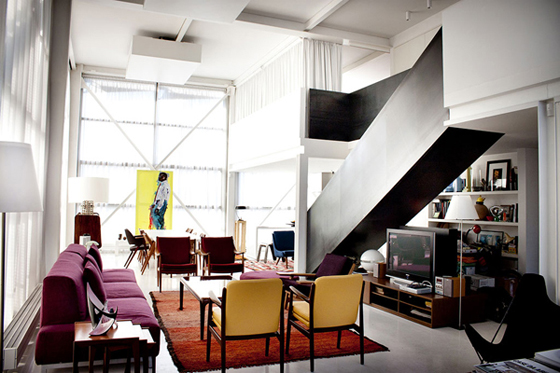
Airbnb by Gensler and Interior Design Fair: The Airbnb office is a hollowed out warehouse that accommodates nearly 200 employees. The space has a massive three-floor ‘Gsky’ living green wall and replicas of actual homes listed on the airbnb website
×Twitter, a comparative internet grandfather at eight years of age, has an interior environment anyone would be happy to retire in. A historic 1937 Art Deco building that once housed the San Francisco wholesale furniture mart is their new global headquarters. Covering two storeys of the existing 11-floor market square complex, IA interior architects and local studio Lundberg Design transformed what used to be a cavernous warehouse into a workplace that features a yoga studio, fitness room, games rooms and a vast cafeteria, with a communal gathering space known as the ‘commons’. For weary workers, there is also a roof garden from which to take in impressive views of the San Francisco skyline. No doubt many of these companies are having a profound impact on our lives – from Instagram providing a platform to drive sales and share personal moments, to Dropbox enabling remote collaboration, and Airbnb reinterpreting the notion of travel. They are providing us with more choices for where and how we live and work, and even when we work.
IA interior architects turned a once cavernous warehouse into Twitters new HQ, with a yoga studio, fitness room, games rooms, cafeteria and roof garden to take in impressive views of the San Francisco skyline
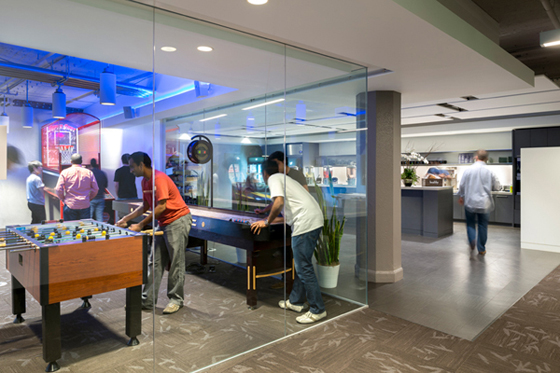
IA interior architects turned a once cavernous warehouse into Twitters new HQ, with a yoga studio, fitness room, games rooms, cafeteria and roof garden to take in impressive views of the San Francisco skyline
×Returning to Apple and their recent Watch and iPhone 6 announcements: what was the service that stood out most for you? iPayments perhaps? U2’s free album miraculously appearing in your iTunes? Probably not! How about the HomeKit? When iOS 8 ships in October, it will offer a feature you can’t see – yet one that could radically alter your day-to-day life more than any other function on your iPhone or Apple Watch. HomeKit is essentially a smart home platform for developers to create connected home accessories, a service that will allow you to control appliances and amenities in your home from your phone or watch. According to Apple’s senior vice-president of software engineering, Craig Federighi: “You could say something like ‘Get ready for bed’ and be assured your garage door is closed, your door is locked, the thermostat is lowered and your lights are dimmed.” There are, no doubt, plenty of developers – in some inspiring workplaces – creating connected accessories for the Apple HomeKit right now. So watch this space. It’s an exciting time to be thinking about the future.
